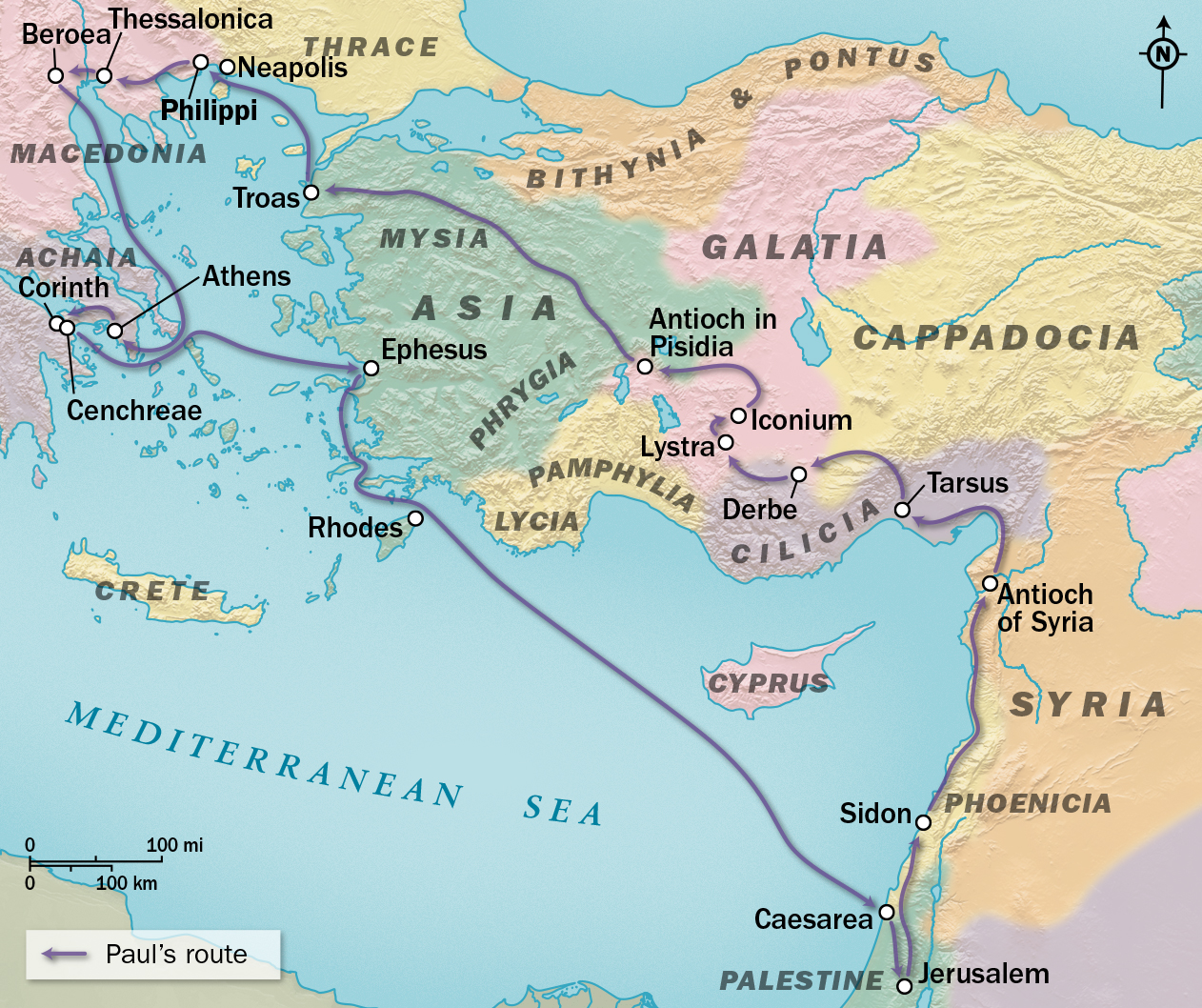CHAPTER SEVENTEEN
The Letter to the Philippians
Orientation
If Galatians is Paul’s angry letter, Philippians is his letter of pure joy. It is full of sweet affection, genuine appreciation, and heartfelt love. Paul holds the Philippians close to his heart, as they have proved themselves to be his genuine partners in the gospel, showing their concern for him in various ways. And though Paul is in chains as he writes, possibly close to death, he is still able to say, “Rejoice in the Lord always!”
The Historical Origins of Philippians
This letter is famous for its hymn concerning Christ’s humility and exaltation: Jesus demonstrated true humility by lowering himself for the sake of others, then God lifted him above all others. It is also known for Paul’s critique of “confidence in the flesh,” in which he lists his own credentials as a faithful Jew but then dismisses them as rubbish compared to knowing Christ. The righteousness that comes from God is based on faith in Christ, not on human credentials and qualifications.
Philippi
Figure 17.1. Location of Philippi [© Baker Publishing Group]
Exploration—Reading Philippians
Partnership in the Gospel
READ PHILIPPIANS 1:1–11
The greeting of this letter focuses on servanthood, as Paul and Timothy are described as “servants of Christ Jesus,” and among their readers in Philippi the overseers and deacons are singled out for special mention (1:1). This focus continues into the thanksgiving (1:3–11) as Paul emphasizes the theme of partnership. Paul gives thanks for all the Philippians because of their partnership in the gospel (1:3–5). They are in Paul’s heart as his partners in grace, “both in my imprisonment and in the defense and confirmation of the gospel” (1:7). He misses them deeply (1:8), and he prays that the Philippians will continue to grow in love, knowledge, and discernment, in order to be pure and blameless in the day of Christ, filled with righteousness through Christ to the praise and glory of God (1:9–11).
The Structure of Philippians
To Live Is Christ, to Die Is Gain
READ PHILIPPIANS 1:12–30
Paul is imprisoned because of Christ, and he regards this as good for the gospel, since everyone (including the whole imperial guard) knows why he is in chains (1:12–13). This has given confidence to others in their preaching, though not all preach with pure motives (1:14–17). But Paul’s only concern is that Christ is preached, whatever the motivation (1:18).
As for Paul himself, he hopes that Christ will be honored in his body, whether by going on living or by his death (1:20). If he goes on living, it is for Christ; if he dies, it is his personal gain (1:21). He would prefer to die and be with Christ, but he thinks he will continue living for now for the sake of others (1:22–26).
A Picture of Paul’s Life
As for the Philippians, as citizens of heaven, they are to live in a way that is worthy of the gospel of Christ (1:27). This means being united in one spirit, wrestling together for the faith, and not giving in to fear (1:27–28). Sharing with Paul in the same struggles, it has been granted to the Philippians to suffer for Christ as well as to believe in him (1:29–30).
Show Humility, Like Christ
READ PHILIPPIANS 2:1–11
If the Philippians experience encouragement, consolation, fellowship, affection, and mercy because of being in Christ, Paul wants them to be united in spirit and purpose (2:1–2). For this to work, believers must not act out of selfish ambition, but in humility they are to look to the interests of others (2:3–4).
He Emptied Himself
Unlike false modesty, genuine humility involves lowering oneself in order to lift up others, as Christ demonstrated in his own life. He gave up the privileges of equality with God in order to become a man, in order to serve humanity by his death on a cross (2:5–8). But as Jesus himself taught, those who lower themselves will be exalted, and so God highly exalted Jesus, giving him the name above every name (2:9). Every knee will bow at his name, and every tongue will confess that Christ is Lord (2:10–11). This is a picture of the day on which the glory of Jesus is finally revealed to all, and all beings in heaven and earth will bow their knees in response to his majesty.
Isaiah’s Servant of the Lord
Shining Like Stars in the World
READ PHILIPPIANS 2:12–30
Paul encourages the Philippians that God is working out his will and purpose in their lives, and so they ought to live accordingly (2:12–14). In so doing, as the children of God they will shine like stars in a crooked and perverted world (2:15), holding on to the word of life (2:16).
Stellar examples of believers who shine like stars in the world include Timothy and Epaphroditus, both of whom demonstrate Christlike humility in their concern for others (2:19–30). Timothy genuinely cares for the Philippians’ interests, while Epaphroditus nearly died from his illness but was more concerned that the Philippians were worrying about him.
Knowing Christ
READ PHILIPPIANS 3:1–21
Paul warns against those who insist that gentile believers must be circumcised (3:2). Rather than putting confidence in the flesh (as with circumcision), believers worship by the Spirit (3:3). In comparison to these false teachers, Paul has more reasons for confidence in the flesh than anyone, since he is “a Hebrew born of Hebrews,” a Pharisee, formerly a zealous persecutor of the church, and blameless in law keeping (3:4–6). But all of this is nothing compared to knowing Christ (3:7–8).
Confidence in the Flesh
Instead of relying on the flesh, such as human achievements or Jewish identity, Paul has lost all things but is found in Christ (3:8–9). And in Christ, he has a righteousness that comes from God, not from outward, fleshly practices (3:9). Instead of pursuing further religious qualifications, Paul simply desires to know Christ more deeply, being shaped by his resurrection, sufferings, and death (3:10).
Being Found in Christ
Paul has not yet fulfilled his goal, but he continues to push toward “the prize promised by God’s heavenly call in Christ Jesus” (3:12–14). The Christian life is one of constantly moving forward toward this goal, and all mature believers should think in this way (3:15). They should live like Paul, not like the enemies of the cross, who are focused on earthly things and will one day be destroyed (3:17–19).
Paul, Augustine, and Conversion Narratives
Instead of being focused on earthly things, believers are citizens of heaven (cf. 1:27) and so “eagerly wait for a Savior from there, the Lord Jesus Christ” (3:20). With loyalty to heaven rather than earth, believers have their eyes fixed there in anticipation of Christ, who will transform their bodies to be like his when he returns (3:21).
Rejoice in the Lord!
READ PHILIPPIANS 4:1–9
Paul longs for his readers to stand firm in the Lord, remembering the things he has just talked about (4:1). This will have some implications for everyday life, such as reconciling differences, as Paul wants the two women Euodia and Syntyche to do (4:2–3). Whatever circumstances we might face (and remember that Paul is in prison as he writes), there is reason to “rejoice in the Lord always” (4:4). Believers have no reason for worry, and they ought to entrust their concerns to God in prayer (4:6), who will give peace to our troubled hearts (4:7).
Standing firm in the Lord also means focusing on things that are true, honorable, just, pure, lovely, commendable, excellent, and praiseworthy—following Paul’s example (4:8–9).
Figure 17.2. Theater at Philippi [Shutterstock / Georgios Tsichlis]
Real Partnership
READ PHILIPPIANS 4:10–20
Paul does not hesitate to make his love and appreciation known to the Philippians. They have shown genuine concern for him (4:10) and provided for his needs (4:15–18). While appreciating the Philippians’ generosity toward him, he knows how to make do with whatever he has, having learned “the secret of being content” (4:11–12). God supplies Paul’s needs (4:13) and will look after the Philippians too (4:19).
A Fragrant Offering
Final Greetings
READ PHILIPPIANS 4:21–23
The letter concludes with greetings from those with Paul, including “those who belong to Caesar’s household,” which seems to refer to believers who work for Caesar managing his vast estates (4:22).
Implementation—Reading Philippians as Christian Scripture Today
The letter to the Philippians gives us insight into Paul’s heart for people and into what it means to share in partnership in the gospel. Paul does not draw on the Philippians’ resources as a disinterested fundraiser, but considers their sharing with him as an expression of love—love for Paul and love for Christ. It encourages us today to consider financial and prayer support for missionaries and other Christian workers as a genuine expression of partnership in their ministry.
Philippians also points to the surpassing glory of the exalted Christ, who humbled himself, suffered, and was lifted up. Believers will share in that same pattern of suffering before glory, and that gives us reason to rejoice in all situations. Though we may suffer, as Paul was indeed suffering when he wrote the letter, we know that suffering is followed by glory.
Moreover, it is through faith in the exalted Christ that we receive righteousness from God. It is not gained through Jewish identity, or any other qualifications or human achievements, but only in Christ. Being found in Christ is the ultimate key to our sense of identity, which can no longer be found in external factors or human status.
Christian Reading Questions
- Put into your own words what Paul means when he says “to live is Christ and to die is gain” (Phil. 1:21). What might this look like in your own life?
- Read Philippians 2:1–11, 19–30; 4:10–19 and reflect on what it means to demonstrate true humility in our relationships with others.
- What might be modern equivalents of Paul’s “reasons for confidence in the flesh” (Phil. 3:4–6)?
- Trace the theme of partnership throughout Philippians. What exactly is partnership, according to Paul, and what does it involve?

